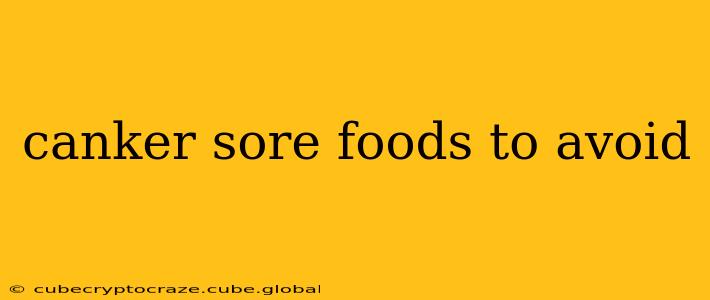Canker Sore Foods to Avoid: A Comprehensive Guide to Dietary Management
Canker sores, those pesky little ulcers that appear inside your mouth, can be incredibly painful and inconvenient. While the exact cause isn't fully understood, certain foods can exacerbate the inflammation and prolong healing time. Knowing which foods to avoid can significantly improve your comfort and speed up recovery. This guide will delve into the specifics, answering common questions about dietary management for canker sores.
What foods trigger canker sores?
Many foods can irritate already-sensitive canker sore tissue. The most common culprits are acidic, spicy, and hard-to-chew foods. These often contain compounds that can directly irritate the ulcer or mechanically damage the surrounding area. Examples include citrus fruits (oranges, lemons, limes), tomatoes, pineapple, spicy peppers, and crunchy chips.
Are there specific acidic foods I should avoid?
Yes, acidic foods are notorious for aggravating canker sores. The high acidity level can increase inflammation and burning sensations. Beyond citrus fruits, avoid acidic processed foods like vinegar-based dressings and marinades, as well as certain juices and sodas.
What about spicy foods?
Spicy foods, rich in capsaicin (the compound that makes them spicy), can cause intense burning and discomfort on already inflamed canker sores. It's best to avoid chili peppers, hot sauces, and highly spiced dishes while you're experiencing an outbreak.
Should I avoid rough or crunchy foods?
Absolutely. Rough or crunchy foods can physically damage the delicate canker sore tissue, hindering healing and increasing pain. Avoid foods like potato chips, pretzels, crackers, and hard nuts during this time. Opt for softer alternatives instead.
What are some other foods to avoid with canker sores?
Beyond the acidic, spicy, and crunchy foods, certain other food types may also contribute to canker sore discomfort. These include:
- Highly processed foods: These often contain artificial ingredients and preservatives which can further irritate the mouth.
- Alcohol: Alcohol can dry out your mouth and exacerbate the discomfort of a canker sore.
- Caffeine: Caffeine is a diuretic, which can lead to dehydration. Dehydration can slow down healing.
- Chocolate: While not acidic in the same way as citrus fruits, chocolate contains compounds that can irritate some people's sores.
How long should I avoid these foods?
It's generally recommended to avoid these trigger foods until your canker sore has completely healed. This usually takes about 7-10 days. However, everyone heals differently, so observe your own progress and adjust your diet accordingly. If the sore persists beyond two weeks, consult a doctor or dentist.
What foods can I eat with canker sores?
Focusing on soft, bland foods during a canker sore outbreak is essential for comfort and healing. Good options include:
- Soft fruits and vegetables: Well-cooked or mashed bananas, applesauce, and sweet potatoes are gentle on sores.
- Dairy products (in moderation): Plain yogurt (especially probiotic varieties) can help soothe inflammation, and milk can be soothing.
- Oatmeal: This is a highly nutritious and soft food that can be easily digested.
- Soups: Broths and well-cooked soups are easy to consume and can provide much-needed hydration and nutrients.
By following this advice and understanding which foods to avoid and which ones to favor, you can better manage your canker sores, promote faster healing, and reduce discomfort. Remember, if you have persistent or recurring canker sores, it's always best to consult a medical professional for proper diagnosis and treatment.
